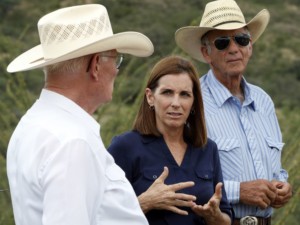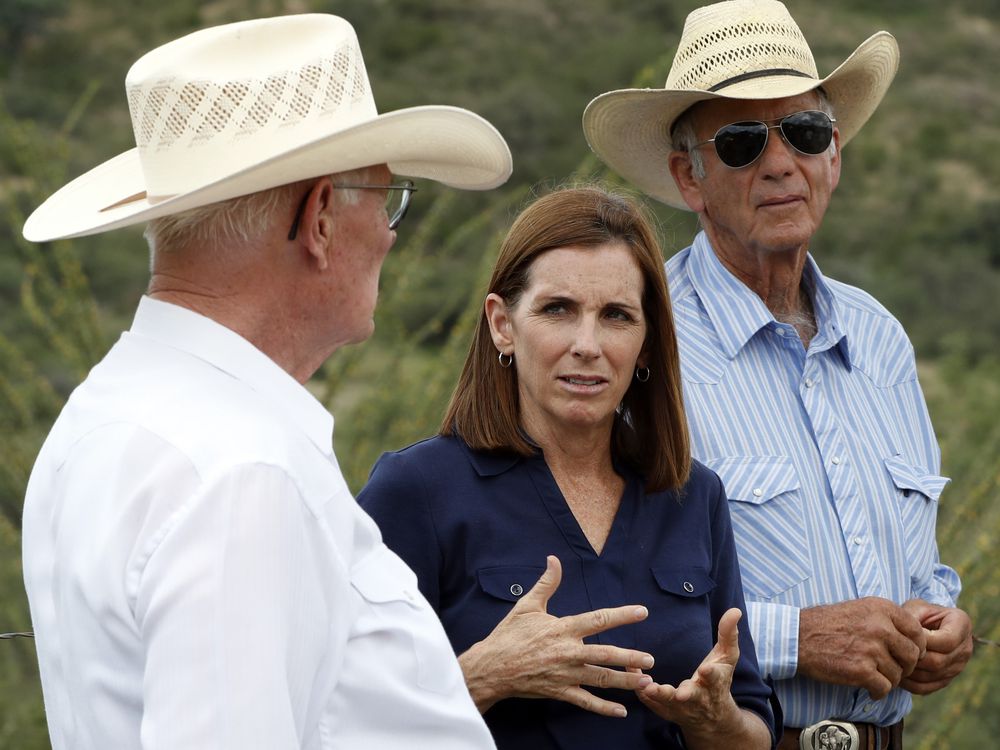
ARIVACA, ARIZ.: Jim Chilton stood before the four strands of barbed wire that separate his ranchland from Mexico and pointed at a nearby ridge. “Very often, I see scouts on that mountain, right there,” he told Rep. Martha McSally.
McSally, a Republican who represents a stretch of the Arizona border in the House of Representatives and is running for U.S. Senate, quickly said she wrote a bill to stiffen penalties for the spotters who help usher people illegally into the United States.
The legislation has since been incorporated into one that would implement dramatic cuts in legal immigration and represents a rightward shift on the issue for McSally.
But here on one of the wildest stretches of the border with Mexico – where Chilton brought a rifle for safety as he showed McSally around – the only issue that came up was security.
For a decade, the fight against illegal immigration has helped Republicans win every statewide election in Arizona. Now, in what’s shaping up to be a difficult November for the Republicans, they are counting on it helping extend their winning streak in Arizona and maintain their hold on the U.S. Senate.
McSally faces Democratic Rep. Kyrsten Sinema in a race that could determine which party controls the Senate, where Republicans currently have a narrow two-vote majority. The two are competing for a seat vacated by Republican Jeff Flake, who retired after his criticisms of President Donald Trump’s hawkish immigration stance and ethics made his re-election impossible.
Mike Noble, a Phoenix-based GOP pollster, quipped that people in other states think the role of immigration in Arizona politics is crazy.
“We’re very unique,” Noble said. “We’re just exposed to it a lot more with the border.”
Immigration routinely polls as a top issue for Arizona Republicans, Noble said. But there’s been a recent shift in a state where a growing Latino population has given Democrats hope. Independents, who comprise about one-third of the electorate, are more interested in education and health care, key Democratic issues.
That may explain why the issue has remained an undercurrent since McSally won the Aug. 28 GOP primary against two immigration hardliners. Instead, McSally, a former air force colonel who was the first female combat pilot, attacked Sinema for the Democrat’s anti-war protests against the Afghan and Iraq wars. Sinema, meanwhile, has focused on health care and veterans issues.
Still, it’s important for McSally to remind Republican voters of the issue – part of the reason that she has lobbied Trump, who has delivered several heated speeches on immigration in Arizona, to return to the state.
In an interview at the Chilton ranch, McSally, viewed as a moderate in her Tucson-area swing district, sharply denied she had shifted on immigration.
“It’s fake news,” she said. “I’ve been a leader on border security since I’ve been in Congress.”
McSally this year dropped her sponsorship of a bill that would have provided legal status to people brought to the country illegally as children after introducing the hardline bill she co-authored. That, she argues, is not a shift – she says she began work on the hardline bill before running for the Senate and never intended to vote for the more lenient measure she had co-sponsored.
Sinema, meanwhile, has also moved rightward on immigration. As a state legislator, she opposed a raft of hardline GOP immigration measures. But she has moved toward the center and was one of the few House Democrats to support increasing legal penalties for people deported multiple times.
While some Republicans fret McSally could alienate Hispanic voters with her tougher immigration stance, Petra Falcon, head of the Latino rights group Promise Arizona, condemned both congresswomen’s maneuvers.
“I think the electorate his been disappointed at both candidates,” Falcon said. AP







